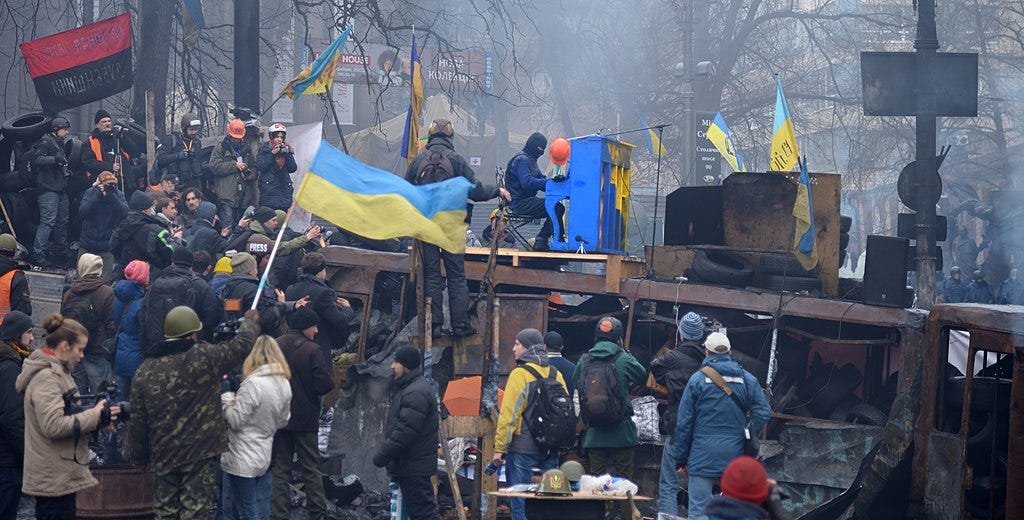Echoes of Conflict: Songs About War, Violence, and Humanity
Take a moment to listen to songs written for war, uprising, protests, and geopolitical violence—A Consequence YouTube playlist.
From “We Shall Overcome” to “Zombie,” music has played a pivotal role in providing people a medium for expression in the middle of conflict and crisis. Some songs bring awareness to issues, others give voice to the voiceless, and others still bring hope and strength in the darkest of times.
These songs talk about death, loss, grief, fear, displacement, hope, courage, and, at times, love. Today, we’re looking at songs and music that came out of war and political violence—songs that helped soldiers go to war, songs about postwar realities, songs used (and reused) in different protests, and more.
More than 108.4 million people worldwide are forcibly displaced as a result of war, geopolitical violence, and internal displacement, according to UNHCR. And major global conflicts in 2023 alone like the Ukraine-Russia War, Israel-Hamas War, Iran protests, civil unrest in Yemen and Ethiopia, election tensions in Pakistan, and so on, have claimed more than four hundred thousand lives. These songs are just glimpses into these experiences but they have the ability to empower and gather.
As you go through the list, take a moment to listen to these tracks through the YouTube links and let us know your favorite tracks.
Metallica’s “One” portrays the story of a young man from before World War I to returning home severely wounded, leaving him blind, deaf, and unable to speak or move. Trapped in his own body, we watch him struggle to communicate.
“Now that the war is through with me
I'm waking up, I cannot see
That there's not much left of me.”
“Harry Patch (In Memory Of)” by Radiohead
Radiohead’s “Harry Patch (In Memory Of)” is a tribute to Harry Patch, the last surviving combat soldier who fought in World War I and died in 2009 at the age of 111.
The song primarily draws on Patch’s personal experiences and highlights the horrors and brutality of the war.
“It was an ambush
They came up from all sides
Give your leaders each a gun and then let them
Fight it out themselves.”
One of U2’s most political songs, “Sunday Bloody Sunday” from their album War describes the terror of Northern Ireland’s Troubles, focusing specifically on the 1972 Bloody Sunday incident in Derry where British troops shot and killed unarmed civil rights protesters. The anger and frustration that arose from the Bloody Sunday incident led to many joining the IRA and continuing the cycle of conflict and violence.
“I can't believe the news today
Oh, I can't close my eyes and make it go away.”
Bono emphasized that the track was not meant as a rebel song but a humanitarian plea to end the killing and crisis.
Many don’t know that the most popular song by The Cranberries, “Zombie,” was actually written as a response to the death of two children in an IRA bombing in Cheshire. Roughly, from the 1960s to the late 20th century, Ireland saw constant geopolitical and religious conflict that led to tens of thousands of bombings and the death of over thirty-five hundred people and many more injured.
The title and lyrics are meant to function as metaphors for the mindlessness of political conflict and war and the never-ending, cyclic nature of such violence.
“But you see, it's not me
It's not my family
In your head, in your head, they are fighting
With their tanks and their bombs
And their bombs and their guns
In your head, in your head, they are crying.”
In 2013, Pakistani artist and singer, Bakht Arif adapted the song in Urdu and Hindi and called it “Zinda Lash”(living body) as a statement against South Asian political conflict.
Listen to the Pakistani version here.
“El Derecho de Vivir en Paz “ by Victor Jara
Victor Jara’s song “El Derecho de Vivir En Paz” (the right to live in peace) was written to protest the Vietnam War.
“Ningún cañón borrará
El surco de tu arrozal
El derecho de vivir en paz.”
(No cannon will erase
The furrow of your rice field
The right to live in peace.)
Since its original intent, the song has been used for and adapted to various causes. The song was sung during the 2019 Chilean protests regarding Santiago’s cost of living, unemployment, privatization, and inequality. The group Músicxs de Chile recreated the song with modified lyrics to include current demands.
“How Does the Grass Grow” by David Bowie
Another song evoking the mindlessness of is Bowie’s “How Does the Grass Grow?” Bowie drew inspiration for the song while reading about military training camps using the chant—
“How does the grass grow? Blood blood blood.”
While the chant works as a rally cry to motivate soldiers preparing for war, it also signifies the dehumanizing nature of such war where we see less and less of what makes us human.
Keep reading with a 7-day free trial
Subscribe to Consequence to keep reading this post and get 7 days of free access to the full post archives.




